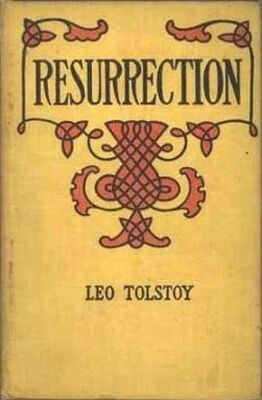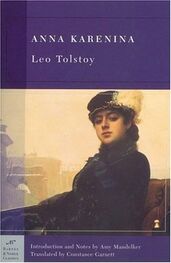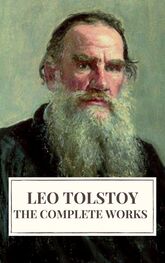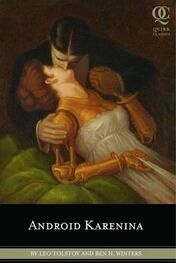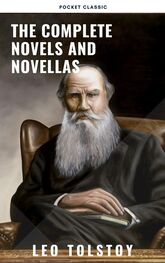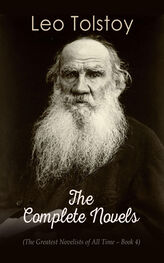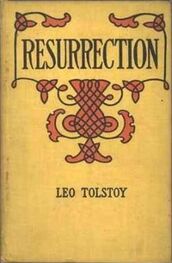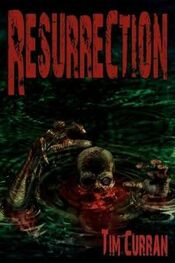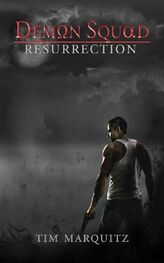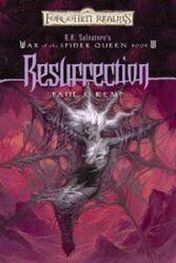She said just what he had been telling himself a few moments before, but he no longer thought so now and felt very differently. He was not only ashamed, but felt sorry to lose all he was losing with her. “I did not expect this,” he said.
“Why should you live here and suffer? You have suffered enough.”
“I have not suffered. It was good for me, and I should like to go on serving you if I could.”
“We do not want anything,” she said, and looked at him.
“You have done so much for me as it is. If it had not been for you—” She wished to say more, but her voice trembled.
“You certainly have no reason to thank me,” Nekhludoff said.
“Where is the use of our reckoning? God will make up our accounts,” she said, and her black eyes began to glisten with the tears that filled them.
“What a good woman you are,” he said.
“I good?” she said through her tears, and a pathetic smile lit up her face.
“Are you ready?” the Englishman asked.
“Directly,” replied Nekhludoff and asked her about Kryltzoff.
She got over her emotion and quietly told him all she knew. Kryltzoff was very weak and had been sent into the infirmary. Mary Pavlovna was very anxious, and had asked to be allowed to go to the infirmary as a nurse, but could not get the permission.
“Am I to go?” she asked, noticing that the Englishman was waiting.
“I will not say good-bye; I shall see you again,” said Nekhludoff, holding out his hand.
“Forgive me,” she said so low that he could hardly hear her. Their eyes met, and Nekhludoff knew by the strange look of her squinting eyes and the pathetic smile with which she said not “Good-bye” but “Forgive me,” that of the two reasons that might have led to her resolution, the second was the real one. She loved him, and thought that by uniting herself to him she would be spoiling his life. By going with Simonson she thought she would be setting Nekhludoff free, and felt glad that she had done what she meant to do, and yet she suffered at parting from him.
She pressed his hand, turned quickly and left the room.
Nekhludoff was ready to go, but saw that the Englishman was noting something down, and did not disturb him, but sat down on a wooden seat by the wall, and suddenly a feeling of terrible weariness came over him. It was not a sleepless night that had tired him, not the journey, not the excitement, but he felt terribly tired of living. He leaned against the back of the bench, shut his eyes and in a moment fell into a deep, heavy sleep.
“Well, would you like to look round the cells now?” the inspector asked.
Nekhludoff looked up and was surprised to find himself where he was. The Englishman had finished his notes and expressed a wish to see the cells.
Nekhludoff, tired and indifferent, followed him.
When they had passed the anteroom and the sickening, stinking corridor, the Englishman and Nekhludoff, accompanied by the inspector, entered the first cell, where those sentenced to hard labour were confined. The beds took up the middle of the cell and the prisoners were all in bed. There were about 70 of them. When the visitors entered all the prisoners jumped up and stood beside the beds, excepting two, a young man who was in a state of high fever, and an old man who did nothing but groan.
The Englishman asked if the young man had long been ill. The inspector said that he was taken ill in the morning, but that the old man had long been suffering with pains in the stomach, but could not be removed, as the infirmary had been overfilled for a long time. The Englishman shook his head disapprovingly, said he would like to say a few words to these people, asking Nekhludoff to interpret. It turned out that besides studying the places of exile and the prisons of Siberia, the Englishman had another object in view, that of preaching salvation through faith and by the redemption.
“Tell them,” he said, “that Christ died for them. If they believe in this they shall be saved.” While he spoke, all the prisoners stood silent with their arms at their sides. “This book, tell them,” he continued, “says all about it. Can any of them read?”
There were more than 20 who could.
The Englishman took several bound Testaments out of a hang-bag, and many strong hands with their hard, black nails stretched out from beneath the coarse shirt-sleeves towards him. He gave away two Testaments in this cell.
The same thing happened in the second cell. There was the same foul air, the same icon hanging between the windows, the same tub to the left of the door, and they were all lying side by side close to one another, and jumped up in the same manner and stood stretched full length with their arms by their sides, all but three, two of whom sat up and one remained lying, and did not even look at the newcomers; these three were also ill. The Englishman made the same speech and again gave away two books.
In the third room four were ill. When the Englishman asked why the sick were not put all together into one cell, the inspector said that they did not wish it themselves, that their diseases were not infectious, and that the medical assistant watched them and attended to them.
“He has not set foot here for a fortnight,” muttered a voice.
The inspector did not say anything and led the way to the next cell. Again the door was unlocked, and all got up and stood silent. Again the Englishman gave away Testaments. It was the same in the fifth and sixth cells, in those to the right and those to the left.
From those sentenced to hard labour they went on to the exiles.
From the exiles to those evicted by the Commune and those who followed of their own free will.
Everywhere men, cold, hungry, idle, infected, degraded, imprisoned, were shown off like wild beasts.
The Englishman, having given away the appointed number of Testaments, stopped giving any more, and made no speeches. The oppressing sight, and especially the stifling atmosphere, quelled even his energy, and he went from cell to cell, saying nothing but “All right” to the inspector’s remarks about what prisoners there were in each cell.
Nekhludoff followed as in a dream, unable either to refuse to go on or to go away, and with the same feelings of weariness and hopelessness.
In one of the exiles’ cells Nekhludoff, to his surprise, recognised the strange old man he had seen crossing the ferry that morning. This old man was sitting on the floor by the beds, barefooted, with only a dirty cinder-coloured shirt on, torn on one shoulder, and similar trousers. He looked severely and enquiringly at the newcomers. His emaciated body, visible through the holes of his shirt, looked miserably weak, but in his face was even more concentrated seriousness and animation than when Nekhludoff saw him crossing the ferry. As in all the other cells, so here also the prisoners jumped up and stood erect when the official entered, but the old man remained sitting. His eyes glittered and his brows frowned with wrath.
“Get up,” the inspector called out to him.
The old man did not rise and only smiled contemptuously.
“Thy servants are standing before thee. I am not thy servant. Thou bearest the seal—” The old man pointed to the inspector’s forehead.
“Wha—a-t?” said the inspector threateningly, and made a step towards him.
“I know this man,” Nekhludoff hastened to say; “what is he imprisoned for?”
“The police have sent him here because he has no passport. We ask them not to send such, but they will do it,” said the inspector, casting an angry side look at the old man.
“And so it seems thou, too, art one of Antichrist’s army?” the old man said to Nekhludoff.
Читать дальше